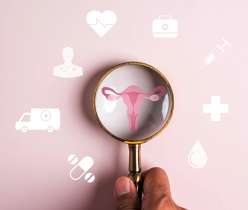According to data, it is estimated that 50 to 60% of women with PCOS are obese or overweight; the link between these two conditions can’t be denied.
Now, the question arises – what does this means for women with PCOS who want to become pregnant?
Polycystic ovary syndrome (PCOS) is an endocrine-gynaecology disease affecting many women of childbearing age. It is a set of symptoms related to an imbalance of hormones that can affect women and girls of reproductive age. In ultrasound, the condition is diagnosed with signs and symptoms of ovarian dysfunction, excess androgen, and polycystic ovarian morphology. Buy women’s health multivitamins supplements online or over the counter to improve your overall health; the best discounts can be cracked when you consider buying women’s health medicines online.
Signs of PCOS
1. Dermatological features:
High levels of androgens typically lead to various dermatological symptoms. These include acne, balding, alopecia, and hirsutism (development of dark hairs on the body areas men typically grow hair, for example- the face, chest, back, and abdomen). In adolescents, sometimes the cause of dermatological symptoms is puberty rather than PCOS.
2. Menstrual disorders:
Menstrual symptoms may vary, from the complete absence of menstruation to menstruation delayed to 35 days or more to heavy bleeding. Women dealing with irregular menstrual bleeding are more likely to develop PCOS. Moreover, women with PCOS are more likely to have infertility issues.
3. Polycystic ovaries:
An excessive follicle is defined as 25 or more follicles 2 mm to 10 mm because of transvaginal ultrasound present in PCOS. In addition, an ovary that is more than ten may be present with increased volume.
Health Implications
PCOS affects many areas of a woman’s life:
– Psychological: Depression, anxiety
– Dermatological: Acne, hirsutism
– Metabolic: metabolic syndrome, obesity, type 2 diabetes, insulin resistance, diabetes
– Sleep: Sleep apnea, disordered sleep
– Reproductive: Miscarriage, preeclampsia, infertility
– PCOS is linked to obesity, impaired glucose tolerance and diabetes.
Supplements can help improve the symptoms only if used under the supervision of a health care expert. Buy women’s multivitamins supplements online today to improve your health.
What’s the link between PCOS and Insulin levels?
Insulin is a hormone produced by the pancreas that converts sugar into cells to be used for energy. As per research studies, most women with PCOS are insulin resistant, leading to high insulin levels, weight gain, and other metabolic issues (elevations in blood cholesterol and triglycerides).
Achieving a healthy weight can be a powerful first step for overweight and obese women dealing with PCOS who want to conceive. Getting appropriate nutrition and exercise helps to lower insulin levels, which can lower the level of certain hormones (androgens) in the ovaries and the blood. Elevation in androgen levels creates a poor environment for egg development. Maintaining weight and insulin levels can help some females resume normal ovulation and improve infertility.
According to research studies, losing weight can restore ovulation and menstruation and, in turn, improves the ability to ovulate.
PCOS and Weight Management
One of the best ways by which overweight or obese woman with PCOS can lose weight is by following a low glycaemic index (GI) diet. High GI foods contain simple carbohydrates like sugar and white flour, causing instant increases and drops in blood glucose levels. Consuming such foods results in high glucose levels and storage of excess glucose as fat. Low GI foods help stabilise blood insulin levels, thus improving the body’s utilization of glucose. Low GI foods include lean meats, whole grains, vegetables, and fruits (like pears, apples, cherries, and strawberries). Foods rich in fiber content are beneficial as they take longer for the body to digest, slowing down sugar absorption.
Benefits of losing weight
Control of calorie intake is important for weight loss. According to research studies, those who wish to lose weight and are aware of how many calories they consume lose more weight than those who do not monitor their calorie intake. One can’t lose excessive weight overnight. It takes a lot of determination, discipline, perseverance, and time. Also, the benefits to fertility and overall health are often remarkable. Exercising for at least five days a week for a minimum of half an hour helps manage weight loss. As every individual is different and experiences different challenges with weight loss, visiting a nutritionist can help create a diet plan appropriate for you.
Conclusion
You are not alone if you have polycystic ovary syndrome (PCOS) and find it difficult to lose weight. Research says more than half of people with PCOS are overweight. According to health care experts, it is imperative to lose weight, but those with PCOS know it’s not easy for various reasons, some of which generate from the disease itself. It is believed that PCOS can affect insulin and other hormones, which results in the storage of more fat and increased appetite. Findings suggest that those with high insulin levels may be able to lose more weight following a low-glycemic diet. Buy women’s health supplements online at affordable rates.




